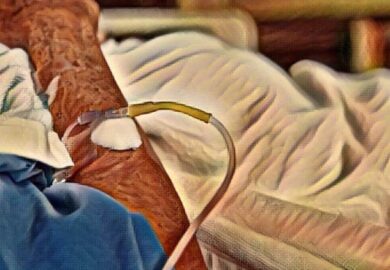Elderly adults or their family members can sue a nursing home for bed sores. Nursing homes are entrusted with caring for elderly adults. Due to their advanced age, physical weakness, and numerous health issues, elderly adults are an especially vulnerable population. Unfortunately, they suffer a variety of injuries due to nursing home neglect. One of the most common injuries nursing home residents suffer is bedsores. Bedsore injuries may cause elderly adults to seek compensation. Lawsuits against nursing homes are legally complex matters to litigate. Nursing homes and their insurance carriers spend significant sums of money to defend against these lawsuits.
Table of Contents

How to Sue a Nursing Home for Bedsores
To sue a nursing home for bedsores, you likely have to sue the nursing home for negligence. Because nursing homes provide a form of medical care, lawsuits for nursing home neglect often allege medical malpractice or negligence. Nursing home lawsuits are tough cases to litigate and require skilled representation by a nursing home negligence lawyer. To successfully sue a nursing home, you must prove that the nursing home provided care that fell below the applicable standard of care. Because there is no statute that defines the applicable standard of care, testimony by an expert medical witness is required to define the standard of care and how the nursing home breached the standard. To prove an elderly adult developed bedsores due to nursing home neglect, a bedsore lawyer must prove the victim developed sores because the nursing home staff committed an act of negligence that allowed bedsores to develop, e.g., left a dehydrated patient unattended for days, or negligently allowed bedsore to develop and failed to provide proper medical treatment.
What Is Nursing Home Neglect?
Pursuant to the Illinois Adult Protective Services Act, neglect is defined as the “failure to provide an eligible adult with, or a willful withholding from an eligible adult, the necessities of life including, but not limited to, food, clothing, shelter or health care.” In short, nursing home neglect occurs when nursing homes fail to provide proper care. This often happens either because staff members are indifferent or because nursing homes are not properly staffed. Specifically, neglect occurs because nursing homes fail to hire sufficient staff members or hire staff members that are not qualified. Similar to home healthcare negligence, nursing home neglect can cause victims to suffer infections and physical injuries from falls due to being left unattended. Nursing home residents are sometimes reluctant to report neglect due to embarrassment, shame, or fear of reprisal or further indifference by staff members.
What Are Bedsores?
Bedsores are pressure ulcers that affect the exterior portion of a person’s skin. Depending on the severity of the ulcer, it can penetrate several layers of the underlying tissue. Bedsores commonly appear on a person’s hips, elbows, and at the base of the spine. While bedsores usually develop over a long period of time, in certain cases they can develop in a matter of hours. Victims that develop bed sores display a variety of symptoms, such as discolored skin. Another symptom is the discolored skin fails to turn white when being pressed. The area of affected skin will also feel spongy or hard, and warm. Finally, victims suffering from bed sores also complain of feeling an itchy sensation in the affected area. Severe bedsores can penetrate down to a victim’s bone.
What Causes Bedsores?
Bedsores are caused by prolonged periods of pressure to a person’s skin. This pressure causes a disruption of blood flow to the skin. People with mobility issues, i.e., elderly adults confined to beds or wheelchairs, are at particular risk of developing bedsores. Nursing home residents can spend hours, if not days, in the same position in a bed or wheelchair. Vulnerable nursing home residents are left unattended in these positions due to nursing home neglect.
Who Is At-Risk for Developing Bedsores?
In addition to nursing home residents with mobility issues, other elderly adults are at risk of developing bedsores. Some nursing home residents are confined to their beds because they are in a coma or suffering from a disease that requires them to be placed on a ventilator. Incompetent staff members can fail to check on elderly residents, which places them at high risk of developing bedsores. Another feature of nursing home neglect is that staff members fail to consistently feed or hydrate elderly adults. Dehydration malnutrition can increase the risk of an elderly adult developing bedsores. Further, elderly adults suffering from diabetes are at high risk of developing bedsores. Elderly adults suffering from Atheroma are also at risk of developing bedsores because diabetes causes blood flow issues. Finally, incontinence increases the risk that elderly adults will develop bedsores because urine and feces can corrode human skin.
Financial Compensation Available in a Nursing Home Lawsuit
There is no way to accurately predict the value of a lawsuit for nursing home neglect, as case value depends on the severity of injuries and the damages sustained. Nonetheless, nursing home residents that suffer from bedsores often need extensive medical care. Some victims require prolonged hospitalization following surgery to remove infected or dead skin. The cost of this medical care can be detrimental to an elderly adult’s financial situation. Some victims, or their families, are forced into bankruptcy due to the financial cost of treating bedsores.
Illinois State law allows nursing home neglect victims to claim economic and non-economic damages. Economic damages consist of a victim’s past and future medical expenses. Non-economic damages consist of the pain and suffering an elderly adult endured due to the bedsores on his or her body. Because elderly adults are often suffering from other medical issues, the pain and suffering they endure from bed sores is made even worse when combined with their other medical issues. A nursing home abuse attorney can help you build a strong case to sue a nursing home for bedsores.



